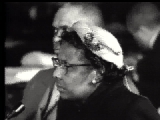
George Edward Chalmer Hayes
Encyclopedia

Annie Lee Moss
Annie Lee Moss was a communications clerk in the US Army Signal Corps in the Pentagon and alleged member of the American Communist Party...
, was the lead attorney in Bolling v. Sharpe
Bolling v. Sharpe
Bolling v. Sharpe, 347 U.S. 497 , is a landmark United States Supreme Court case which deals with civil rights, specifically, segregation in the District of Columbia's public schools. Originally argued on December 10–11, 1952, a year before Brown v. Board of Education, 347 U.S...
, and later became the first African American
African American
African Americans are citizens or residents of the United States who have at least partial ancestry from any of the native populations of Sub-Saharan Africa and are the direct descendants of enslaved Africans within the boundaries of the present United States...
to serve on the District of Columbia Public Utilities Commission.
Biography
He was born in Richmond, VirginiaRichmond, Virginia
Richmond is the capital of the Commonwealth of Virginia, in the United States. It is an independent city and not part of any county. Richmond is the center of the Richmond Metropolitan Statistical Area and the Greater Richmond area...
and graduated from Brown University
Brown University
Brown University is a private, Ivy League university located in Providence, Rhode Island, United States. Founded in 1764 prior to American independence from the British Empire as the College in the English Colony of Rhode Island and Providence Plantations early in the reign of King George III ,...
in 1915, and then earned a law degree from Howard University School of Law
Howard University School of Law
Howard University School of Law is one of the professional graduate schools of Howard University. Located in Washington, D.C., it is one the oldest law schools in the country and the oldest historically black college or university law school in the United States...
in 1918. He taught at Howard University School of Law starting in 1924 while he maintained a private practice in the District of Columbia. With Spottswood William Robinson III
Spottswood William Robinson III
Spottswood William Robinson III was an educator, civil rights attorney and judge.In the early 1950s, Robinson and his law-partner Oliver Hill litigated several civil rights lawsuits in Virginia. In 1951, Robinson and Hill took up the cause of the African American students at the segregated R.R...
, he was the lead counsel on Bolling v. Sharpe
Bolling v. Sharpe
Bolling v. Sharpe, 347 U.S. 497 , is a landmark United States Supreme Court case which deals with civil rights, specifically, segregation in the District of Columbia's public schools. Originally argued on December 10–11, 1952, a year before Brown v. Board of Education, 347 U.S...
, the companion case to Brown v. Board of Education
Brown v. Board of Education
Brown v. Board of Education of Topeka, 347 U.S. 483 , was a landmark decision of the United States Supreme Court that declared state laws establishing separate public schools for black and white students unconstitutional. The decision overturned the Plessy v. Ferguson decision of 1896 which...
. Hayes argued that denying Black students the liberty to attend non-segregated schools violated due process. Bolling was decided under the Fifth Amendment's due process clause while Brown was decided under the Fourteenth Amendment's
Fourteenth Amendment to the United States Constitution
The Fourteenth Amendment to the United States Constitution was adopted on July 9, 1868, as one of the Reconstruction Amendments.Its Citizenship Clause provides a broad definition of citizenship that overruled the Dred Scott v...
Equal Protection Clause
Equal Protection Clause
The Equal Protection Clause, part of the Fourteenth Amendment to the United States Constitution, provides that "no state shall ... deny to any person within its jurisdiction the equal protection of the laws"...
.

